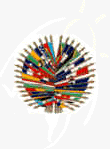
ORGANIZATION OF AMERICAN STATES
XXVIII General Assembly
Caracas, Venezuela
 |
ORGANIZATION OF AMERICAN STATES XXVIII General Assembly |
VENEZUELAN PRESIDENT OPENS OAS GENERAL ASSEMBLY
June 1st, 1998. Caracas, Venezuela
The General Assembly of the Organization of American States (OAS) today began its twenty-eighth regular session with a clear message in support of the hemisphere�s democratic systems and a call to combat critical levels of poverty.
"Democracy is now a reality all across the Americas," Venezuelan President Rafael Caldera said as he declared the OAS General Assembly open, with representatives of the 34 member countries present. He did caution, however, that "we are seeing democracy at a delicate moment, with vexing signs in some countries where some think that dictatorships, with all their defects and crimes against humanity, can bring about solutions to problems that democratic governments cannot solve."
President Caldera also said that democracy is the system of government that has the most self-destructive tendencies. "Generally, we democrats tend to be the worst enemies of democracy," he said. He also said that since the Santiago Summit, the OAS is participating more actively in the solutions of problems faced by member countries.
Affirming the growing responsibility of the OAS, the Venezuelan president said the two hemispheric summits have shown that a permanent collective organization is necessary. "The participation of the OAS in the Santiago Summit is just one indication of the active participation to resolve our countries� problems," he said.
For his part, the OAS secretary general, Cesar Gaviria, gave an overview of the intense process of change sweeping the Organization to adjust its structure to the new hemispheric realities. He described the OAS commitment to the inter-American system as "unshakable, as I am convinced that the timely and thoughtful decisions you adopt will ensure that the Organization will begin, on the right footing, on its way down the road to the 21st century."
Mr. Gaviria also referred to the Cuba situation, calling it the most important political problem to resolve in the hemisphere. "We always hold out the possibility of considering Cuba�s return to the inter-American system should tensions be lowered, progress be made toward greater public and economic freedoms, as well as should greater protection of human rights be achieved on the island," he said.
Referring to the new responsibilities that the OAS has been called on to assume as a result of the Miami and Santiago summits, Secretary General Gaviria said the mandates received from the hemisphere�s presidents represent "a vote of confidence which also entails enormous responsibility." However, he said, "I believe the time has come for the Ministries of Foreign Affairsand the Foreign Ministers to engage in the complicated process of decision-making that awaits us in the months ahead." He affirmed that the OAS can assume the majority of the Santiago commitments, despite its limited resources.
Among the topics he said were of utmost priority at the Santiago Summit, the OAS Secretary General highlighted poverty. "It is paradoxical that a hemisphere rich in resources and opportunities has left behind millions of its sons helplessly trapped in the claws of misery," he said. Secretary General Gaviria expressed his hopes that the Inter-American Plan To Combat Poverty "will contribute significantly to the quality of policies and the institutional framework to confront this collective problem."